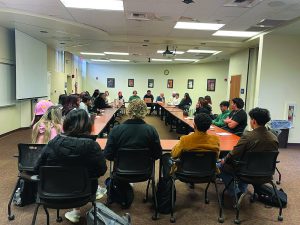
The Levan Center was alive with conversation as students, faculty, and staff gathered for this semester’s first Gadfly Cafe. Hosted by philosophy professor Reggie Williams, the Gadfly Cafe serves as a casual place with a conversational roundtable where people talk about different topics. This month’s topic centered on solidarity, a topic that brought out thoughtful discussions and deep reflections.
Held every first Wednesday of each month from 12:30 to 1:30, the Gadfly Cafe invites people to talk about how personal views and group politics are connected. Williams said the sessions are informal and open. Allowing people who will attend to come and go as needed.
The discussion started by looking into the roots of the word “solidarity” and its various meanings. The conversation changed through political identities, race, gender, ethnicity, religion, and looking at how solidarity shows up in different situations.
Williams encouraged everyone there to participate to reflect on their personal experiences with solidarity. “Who do you feel it with, and why?”
he asked, leading the conversation to stories about unity among immigrants, students, and people who are treated unfairly.
For attendee Gracie Perez, the conversation about gender and race stood out the most to her. “What really stuck out was the gender and race topics, and I really liked how it was a discussion that didn’t turn into a full-blown argument,” she stated.
The group also talked about how solidarity can be complicated. Topics like abortion and gender inequality led to debates on how solidarity can bring people together but also split them apart.
Perez shared her own struggle with defining her view on feminism. She said, “I really want to consider myself a feminist, but I have brothers, so I’m not sure I can.” This proves that people can find solidarity in their own lives.
At the end of the session, Williams talked about how important places like the Gadfly Cafe are. “It’s about letting people talk about their perspectives,” he said. The room, which was full of strangers at first, felt more connected by the end, giving it a sense of solidarity.

